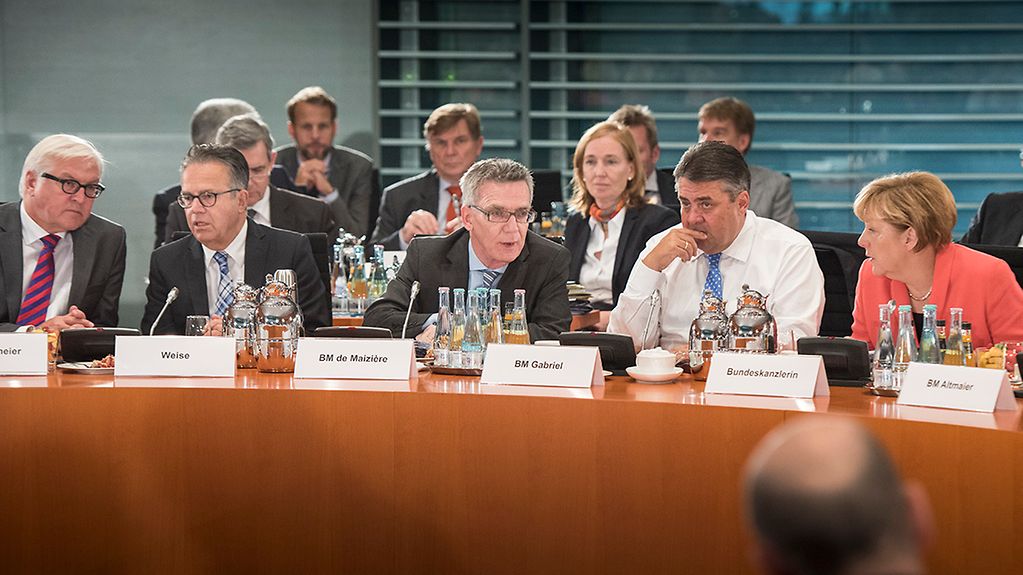Meeting of federal and state governments on refugees
The federal government and the premiers of the sixteen federal states have agreed on a series of measures to address the refugee crisis. The amendments to legislation are to "be effective as of 1 November", said the Chancellor. This is "a good day for local authorities", declared Angela Merkel. In future, the federal government is willing to pay a lump sum of 670 euros per refugee per month.
3 min reading time

Legislative and financial matters were high on the agenda when state premiers met with the federal government
Photo: Bundesregierung/Bergmann
Chancellor Angela Merkel and Federal Interior Minister Thomas de Maizière met at the Federal Chancellery with the premiers of the federal states and Frank-Jürgen Weise, who now heads both the Federal Employment Agency and the Federal Office for Migration and Refugees. High on the agenda of this second meeting within two weeks were decisions on legislative and financial matters.
Humanitarian, administrative and financial challenges
"We in Germany cannot effectively address the challenge posed by the refugee problem on our own," stressed Angela Merkel. She once again called for solidarity in Europe. The German federal government and the state premiers agree that attention must focus on addressing the root causes of the problem.
In 2015 Germany expects some 800,000 refugees – more than ever before in the history of the Federal Republic of Germany. The federal government, the state governments and local authorities are facing enormous humanitarian, administrative and financial challenges.
Non-cash benefits
Potentially undesirable incentives are to be eliminated, reported Chancellor Angela Merkel. For as long as refugees are housed in initial reception facilities, they will, as far as possible, receive all they need in the form of non-cash benefits, keeping cash benefits to an absolute minimum. Individuals to be returned to their own countries will see their benefits cut. Cash payments will be made for no more than one month in advance.
Western Balkan states declared safe countries of origin
"We have agreed on a list of safe countries of origin," said the Chancellor. Albania, Kosovo and Montenegro are to be declared safe countries of origin. Requests for asylum lodged by nationals of these states, who have no prospects of being accepted as refugees, can be processed more swiftly, and their stay in Germany thus ended sooner.
Last year saw a huge surge in the number of applications for asylum lodged by nationals of these states. More than nine of every ten applications are rejected. Although Albania, Kosovo and Montenegro have been declared safe countries of origin, asylum-seekers will still be able to present their own individual cases and prove that they suffer persecution.
Financial resources from federal government
"We need a fair sharing of the burden," said Angela Merkel. The federal government will shoulder a percentage of the costs incurred by asylum-seekers and refugees on a structural and long-term basis, with provision for price dynamics. In future the federal government will pay the federal states a lump sum of 670 euros per refugee per month. This sum will be payable as of the registration of the refugee and until the asylum proceedings are completed.
This ought to put in place a "breathing system" geared to the length of asylum proceedings and the number of refugees. "The federal government will shoulder two risks: the length of time required to process applications and the number of asylum-seekers," said Angela Merkel. The federal government is to provide 500 million euros for the construction of social housing, and another 350 million euros for refugees who are unaccompanied minors. The funds earmarked for the now discontinued childcare supplement will also be made available to the federal states.